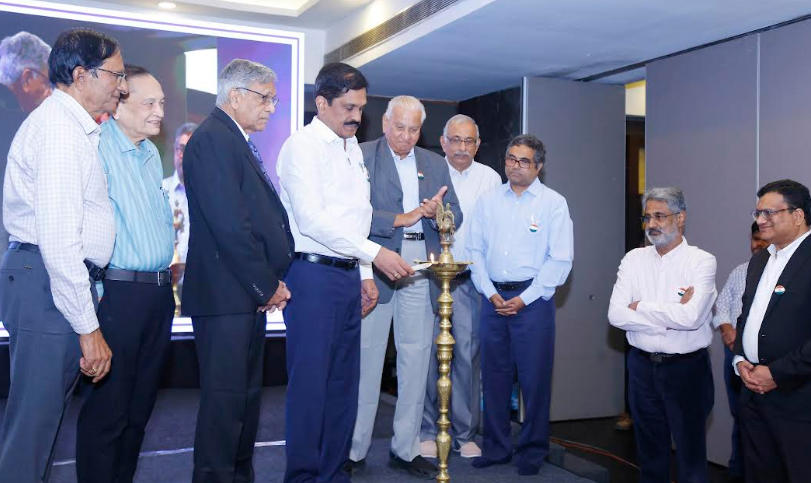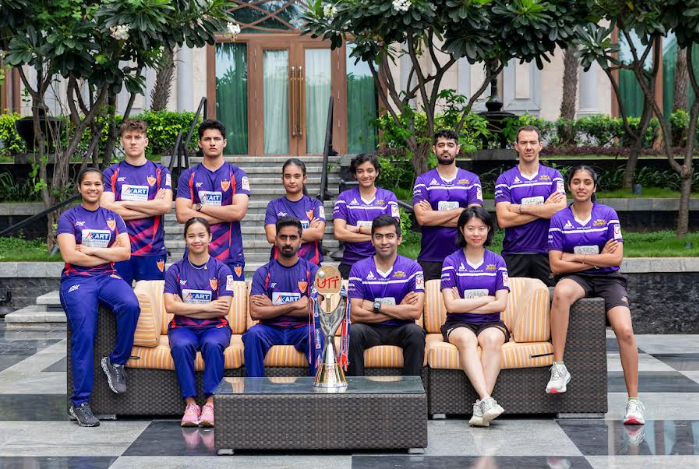Vijayawada, 3rd March 2025: The Indian Organization for Rare Diseases (IORD), a non-profit advocacy body, today convened a critical conference titled “RAISE THE AWARENESS – RARE DISEASES: Advocate Public Policy, Promote Diagnosis, Treatment & Social Services” at Fortune Murali Park, Vijayawada, to mark World Rare Disease Day 2025.
The event, attended by healthcare experts, policymakers, and patient advocates, spotlighted the urgent need for systemic interventions to address the challenges faced by over 90 million Indians and 300 million individuals globally living with rare diseases.
Chief Guest Sri M.T. Krishna Babu, IAS, Special Chief Secretary for Health, Medical & Family Welfare, Government of Andhra Pradesh; speaking after inaugurating the Raise The Awareness – Rare Diseases hosted by The Indian Organization for Rare Diseases; said, The Indian Organisation for Rare Diseases (IORD) President and CEO, Prof. Ramaiah Muthyala Garu, has put in tremendous effort in the field of rare diseases. His passion and dedication to this cause are truly commendable. We are honored to be associated with this noble initiative. We extend our heartfelt congratulations and appreciation to Prof. Ramaiah Garu and his team for their sincere efforts in raising awareness about the prevalence of rare diseases and bringing stakeholders together on a common platform to explore the best possible solutions. As Prof. Ramaiah Garu has already emphasized, while we cannot reverse the past or cure all rare diseases, we can certainly create an environment that provides comfort and dignity to those affected.

The World Health Organization (WHO) estimates that 65 people in one lakh people are affected by rare diseases. However, statistics indicate that nearly 5% of the population suffers from some form of rare disease. While some of these conditions are partially treatable, others require lifelong treatment, often with expensive medications. In 2021, the Government of India introduced the National Policy for Rare Diseases, which provides a structured approach to addressing these conditions. Under this policy, individuals can register at one of the 12 designated Centers of Excellence for Rare Diseases. However, given that India has a population of nearly seven to eight crore people affected by rare diseases, these centers alone are insufficient.
Every state government must formulate its own policy to address this pressing issue. Unfortunately, due to a lack of awareness and vocal representation from affected individuals, governments have not allocated substantial budgetary resources for rare disease treatments.
One key recommendation from the Indian Organisation for Rare Diseases is to establish a Center of Excellence for Rare Diseases in Andhra Pradesh. This would ensure that individuals with rare diseases receive proper guidance, registration, and benefits from the Rashtriya Arogya Nidhi (RAN) scheme, which provides up to ₹50 lakh worth of medicines for registered patients. Potential locations for this center include AIIMS Mangalagiri or King George Hospital (KGH), which is affiliated with the 100-year-old Andhra Medical College and has a strong presence of specialized and super-specialized departments. Although KGH has already been designated as a Center of Excellence for certain diseases, rare diseases require official notification from the Government of India. We will assess the necessary facilities and work towards securing this recognition, ensuring that Andhra Pradesh contributes effectively to the management of rare diseases.
The Indian Organisation for Rare Diseases is driven by dedicated and passionate individuals who are committed to this cause. I am confident that they will develop a practical strategy that enables the state government to take significant steps toward managing rare diseases effectively. We are eager to collaborate with IORD and its selfless team members, who tirelessly work for the well-being of disadvantaged individuals and their families. No family willingly wishes to deal with such challenges—it is beyond human control. However, it is our responsibility to manage these circumstances in the best possible way. Support must come not only from the government but also from society at large. Once a practical plan is developed, we are ready to collaborate to bring solace to affected families.
Our honorable Andhra Pradesh Chief Minister, Shri N. Chandrababu Naidu, has emphasized the importance of genetic mapping. He has initiated a massive effort to conduct genome sequencing and develop a disease profile of the population using advanced genetic analytics. We hope that future efforts in identifying and registering affected individuals will help them access better medical care. Once a condition is diagnosed, we can plan further steps, such as identifying available treatment facilities, facilitating sponsorships, and coordinating with relevant organizations to ensure quality healthcare.
I sincerely hope that the two decades of hard work by the Indian Organisation for Rare Diseases will bear significant fruit in the coming years. I urge the members to continue their efforts with the same enthusiasm and take this campaign forward. The government will do its best to support and strengthen these initiatives. Thank you for organizing this meeting in Vijayawada for the second time. Being from a Telugu-speaking state, you bring a special passion to this cause, and we are confident that your presence will be instrumental in helping Andhra Pradesh take a leading role in rare disease management.
Global and National Crisis
With over 7,000 identified rare diseases impacting 5% of the world’s population, patients in India grapple with delayed diagnosis, scarce treatments, and exorbitant healthcare costs. In Andhra Pradesh alone, thousands remain undiagnosed or untreated due to limited infrastructure and awareness. Extrapolating from the 2021 census data, Andhra Pradesh’s population is approximately 5.27 crore (52.787 million).
Assuming a 5% prevalence of rare diseases, the estimated rare disease population in Andhra Pradesh is approximately 26.39 lakh.
Key Recommendations for Andhra Pradesh
The conference outlined six actionable proposals for the Andhra Pradesh Health Ministry to transform rare disease care:
1. Establish a Centre of Excellence (CoE): Upgrade AIIMS Mangalagiri as a Centre of Excellence for rare disease treatment, leveraging central funds to enhance access to specialized care.
2. State-Funded Rare Disease Centre: Provide genetic counselling, subsidized testing, and a toll-free helpline under existing health schemes.
3. Statewide Rare Disease Survey: Train Anganwadi workers to conduct a pilot survey, enabling data-driven policy formulation. IORD would be glad to facilitate the training.
4. National Family Health Survey (NFHS) Inclusion: Advocate adding rare disease questions to NFHS-6 for rare disease prevalence mapping in the state.
5. District-Level Coordination Committees: Streamline referrals and central funding access for Rs. 50 lakh/patient under Rashtriya Arogya Nidhi.
6. Centralized Drug Procurement: Negotiate bulk purchases of therapies like enzyme replacements to reduce costs for rare disease patients.
Sri Satya Kumar Yadav, Hon’ble Minister for Health, Andhra Pradesh, emphasized, who could not be physically present in view of the assembly session, said “We are committed to evaluating IORD’s proposals to build an inclusive healthcare framework.”
Dr. Ramaiah Muthyala, IORD President, added, “Andhra Pradesh has the potential to lead India in rare disease care. Prioritizing these steps will save lives and set a national benchmark.” While submitting a memorandum to the Sri M.T. Krishna Babu, IAS, Special Chief Secretary, Health Medical & Family Welfare, Govt. of Andhra Pradesh, Dr Ramaiah Muthyala requested the Andhra Pradesh government to take up actionable steps for the betterment of rare disease community.
In his address, Sri M.T. Krishna Babu, IAS, Special Chief Secretary, Health Medical & Family Welfare, Govt. of Andhra Pradesh, promised a slew of healthcare measures for rare disease community in the state besides listing out several steps the AP government has already initiated. He said that the AP government would initiate steps to provide affordable medications/drugs for rare disease patients by seeking a list of such drugs from Director of Medical Education, AP. He also promised to seek a Centre of Excellence for Rare Diseases designated by the Centre either at AIIMS Mangalagiri or Andhra Medical College, KGH besides utilizing the services of ASHA and ANM health workers for creating awareness and identification of rare disease patients. Please check the full video for his speech.
Some of the actionable steps for rare disease community listed by him included roping in Anganwadi and ASHA workers and utilising health workers for gathering rare disease date through National Family Health Survey in the state.
National Institution for Transforming India (NITI) Aayog member Dr. Vinod K. Paul, Member, in his video address to the participants, presented significant developments in India’s approach to rare diseases. The government has prioritized treatment for 13 rare disorders, including both small molecule drug treatments and complex therapies. Please check his video address.







